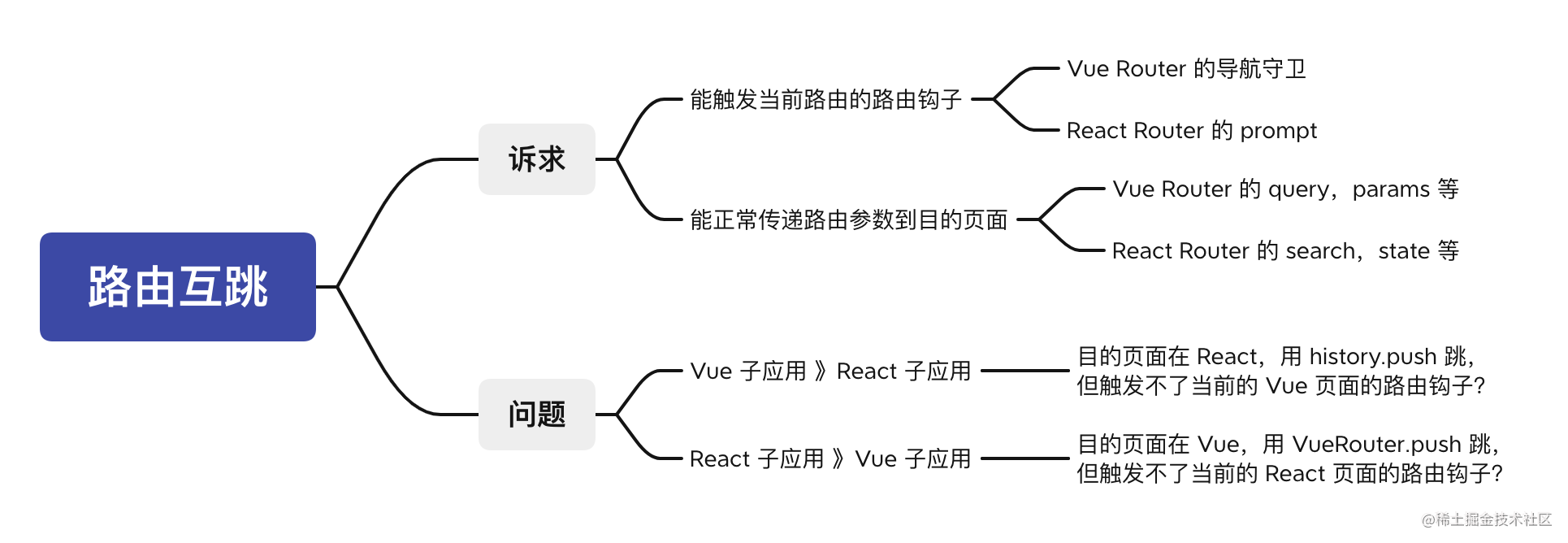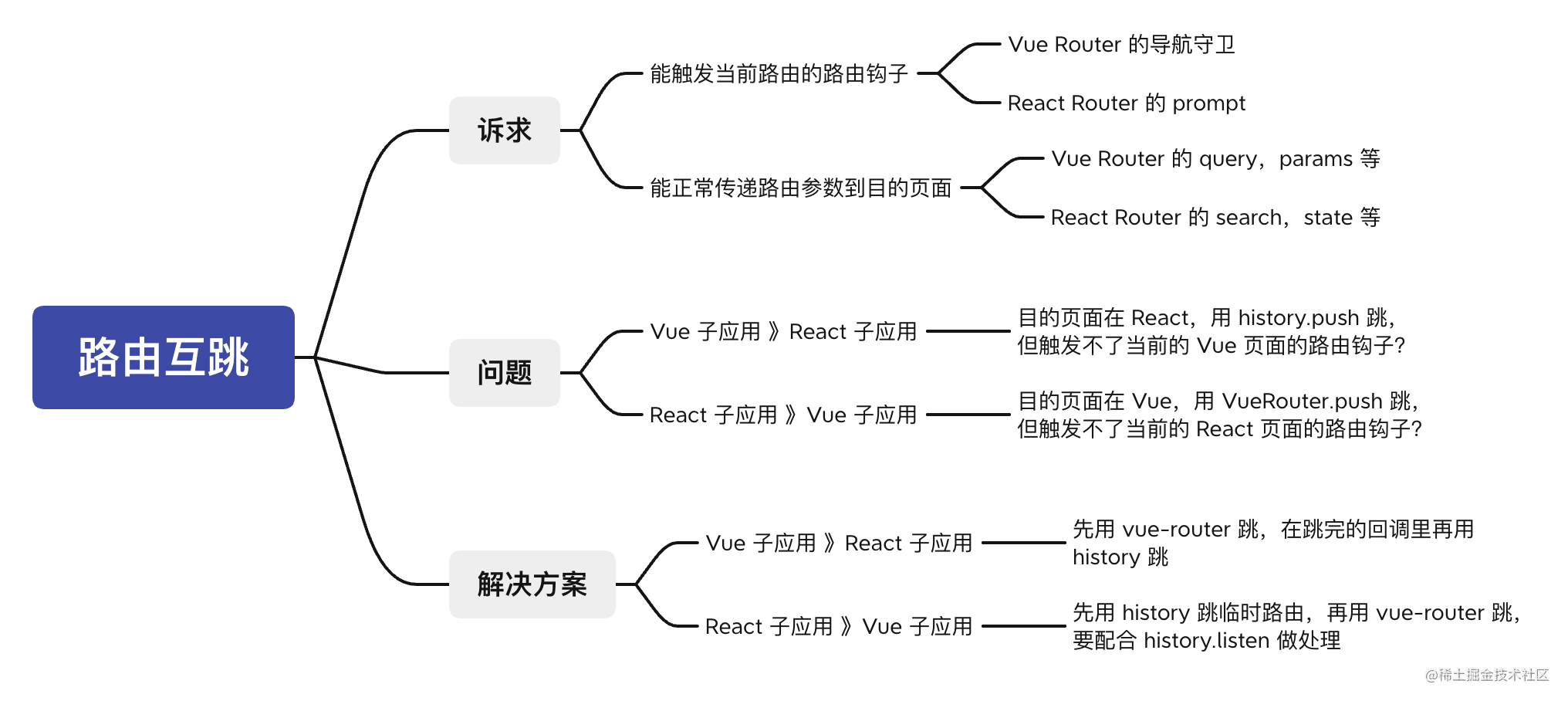前言
本文介绍的是在做微前端 single-spa 项目过程中,遇到的 Vue 子应用和 React 子应用互相跳转路由时遇到的问题。
项目情况:single-spa 项目,基座用的是 React,目前是2个子应用一个 Vue 一个 React。路由方案是 Vue Router,React Router + history。
有交互场景是从 Vue 子应用跳转到 React 子应用,或者从 React 子应用跳转到 Vue 子应用,因此遇到了问题。
遇到的问题

结合项目诉求和遇到的问题,大家可以先思考一下有什么解决方案~
------------------------------分割线------------------------------
解决的方案
主要是要处理好以下2个因素:
-
正常触发当前页面的路由钩子
-
正常传路由参数到目的页面
我一开始尝试去查阅社区文章和看部分源码,看是否有什么特殊方式自主去触发路由钩子,等钩子处理完成之后再跳转去目的页面(跳去 Vue 用 Vue Router,跳去 React 用 React Router)
但看源码下来发现,想要触发 Prompt 还是需要调用 history.push 触发流程,想要触发 Vue Router 导航守卫还是需要调用 VueRouter.push 触发流程
所以结合这两点我整出了解决方案,已使用在项目当中,下面是封装的全局路由跳转工具:
window.micro = {
// 子应用,会在相应应用挂载完成后设置
apps: { vue: null, react: null },
history: {
push: (location, onComplete, onAbort) => {
const url = typeof location === 'string' ? location : location.path;
// 判断是哪个子应用
const currentIsReact = isReactApp();
const nextIsReact = isReactApp(`#${url}`);
// 处理路由参数
let state = {};
let query = {};
let name = '';
if (typeof location !== 'string') {
state = location.params || {};
query = location.query || {};
name = location.name || '';
}
if (!currentIsReact && nextIsReact) {
// vue 跳 react:先用 vue-router 跳,在跳完的回调里再用 history 跳
const reactHistoryHandle = () => {
onComplete?.();
history.push(`#/temp?t=${Math.random()}`);
history.replace({ state, pathname: url, search: setQueryStringArgs(query) });
// 因为跳多了1次 vue-router,所以 back 一下
window.micro.apps.vue2.$router.back();
};
window.micro.apps.vue.$router.push(name ? { name, params: state, query } : { path: url, query }, reactHistoryHandle, onAbort);
} else if (currentIsReact && !nextIsReact) {
// react 跳 vue:先用 history 跳临时路由,再用 vue-router 跳,要配合 history.listen 做处理
react2vue = () => {
window.micro.apps.vue.$router.push(name ? { name, params: state, query } : { path: url, query }, onComplete, onAbort);
};
history.push('/temp_react_to_vue');
} else if (currentIsReact && nextIsReact) {
// react 跳 react:没有特殊,正常用 history 跳
} else {
// vue 跳 vue:没有特殊,正常用 vue-router 跳
}
},
},
};
配合的监听和工具函数:
// 处理 react 跳 vue的情况
let react2vue = null;
history.listen((location, action) => {
// 处理在临时路由的下一个路由,要返回上一个路由时,需要跳过临时路由
if (location.pathname === '/temp_react_to_vue' && action === 'POP') {
history.goBack();
} else if (location.pathname === '/temp_react_to_vue') {
// 在这里跳去真实的 vue-router 路由
react2vue?.();
react2vue = null;
}
});
// 工具函数
function isReactApp(hash = location.hash) {
// 实际根据自己微服务项目的子应用情况判断
return hash === '' || hash === '#/'
|| ['#/list', '#/read/', '#/compose', '#/login'].some(router => hash.startsWith(router))
;
}
// 把query参数变成query字符串,如 {a:1, b:2} 返回 ?a=1&b=2
function setQueryStringArgs(args) {
let str = '';
args = args || {};
for (const [key, value] of Object.entries(args)) {
str += `${key}=${encodeURIComponent(String(value))}`;
}
return str ? `?${str}` : '';
}
总结

这是我在实际项目中使用的方案,如有更优雅更好的方案,希望在评论区和我讨论~
收获 / 小彩蛋
因为之前已经对 Vue Router 原理和源码比较熟悉了,所以这次借着这个问题,主要是去了解了 React Router 的 Prompt 组件的实现,这里简单总结一下:
